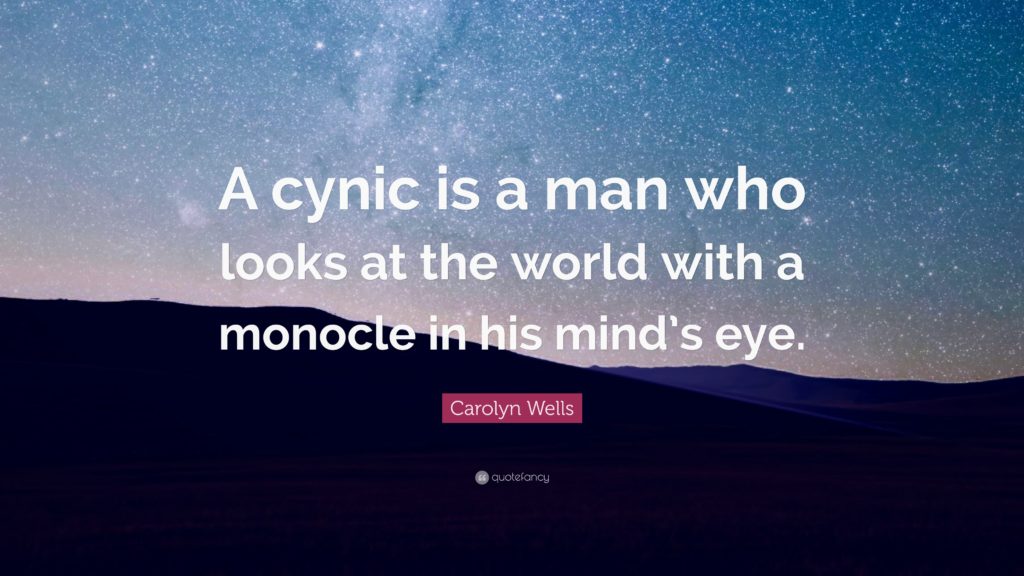
Idealism is often seen as a way of thinking characterized by beliefs that are overly optimistic and positive, but not realistic or well thought-out. However, a healthy mix of idealism and pragmatism is needed to see improvements and progress in our world. Through several examples of visionaries who demonstrated these qualities, you’ll learn the value of idealism and how you can cultivate it within yourself. (Estimated reading time: 4-5 minutes)
“Let us reach for the world that ought to be.”
— Barack Obama
It’s hard to be an idealist today.
There’s always something tragic happening. Just turn on the news, and you’ll see a flood of headlines about the latest shooting, natural disaster, political scandal, or crime.
Each headline adds a layer of doubt and cynicism, smothering our hopeful hearts. Gradually, we stop believing things can ever get better because we’re afraid of being disappointed. Comedian George Carlin said, ‘scratch any cynic and you will find a disappointed idealist.”
I was reminded of this during a recent debate that I had with my classmates about solutions to gun violence – understandably a sensitive issue right now. To my surprise, my assertion that education and mental health treatments as a viable solution was ridiculed. “We may as well sing ‘kumbaya’ and hope that things will get better with those ideas,” they said.

Initially, I was triggered by their opposition – I took it personally. I realized soon after that my classmates’ attitude was simply a representation of the collective, and it strengthened my resolve to do whatever I can to alter it.
The official definition of idealism is “the belief that your ideals can be achieved, often when this does not seem likely to others”. What’s interesting is that the phrase, ‘does not seem likely’ is determined by ‘other people’ based on their own unique belief systems. It doesn’t represent the truth of what’s possible, and therefore, shouldn’t limit us.
John Keating, the English teacher in the movie Dead Poet Society, played by Robin Williams, is the quintessential idealist. Using his unorthodox teaching style, he encourages his students to break free from the confines of ancient traditions and the pressures of academia.
Through his prose, he opens their minds so that they can emerge from their shells and build a vision for their lives:
‘Carpe diem. Seize the day, boys. Make your lives extraordinary.’
Yet Keating was also careful not to delude his students into believing that idealism alone can change the world. He clearly expresses that it needs to be balanced with a healthy dose of pragmatism and independent thought:
“I stand upon my desk to remind myself that we should constantly look at things in a different way. See, the world looks very different from up here… Just when you think you know something, you have to look at it in another way.”
In saying this, Keats encouraged his pupils to look at the big picture and not get lost in minutiae. By having a longer view, we can take informed action that fetches results.

This healthy mix of idealism and pragmatism is precisely what we see in some of the greatest visionaries in history. Imagine if Gandhi had not been inspired by his ideals of freedom and non-violence, or if Eleanor Roosevelt hadn’t tapped into her morals and ethics to fight for the underdogs of her time? It would have changed the course of history.
Think of all the masterpieces that would never have seen the light of day if the artists hadn’t been moved by their poignant perspectives. Idealism fueled Michelangelo’s efforts to create magnificent frescoes such as the Sistine Chapel. It inspired John Lennon to write meaningful songs like Imagine, and it was the hope for a more just society that made Harper Lee write her novel To Kill a Mockingbird.
Here are three reasons why our world still needs idealism:
1. It motivates us to find solutions to existing problems: An idealistic perspective promotes feelings of hope. The hope for a better future can galvanize us into seeking solutions, no matter how bleak things might appear on the surface. Martin Luther King demonstrated this in his famous speech, “I Have a Dream” where he expressed a vision of his nation rising up and ‘living out the true meaning of its creed’. He said this during the height of the Civil Rights Movement, in which he faced immense opposition while trying to promote equal rights for his people.
2. It leads to innovation and progress: Idealism is like a ship that transports us to unknown, distant shores. It activates a childlike sense of curiosity that inspires us to explore new avenues, without judgement. Astrophysicist Carl Sagan, who is famous for his breakthrough research in astronomy, was a dreamer at heart. Deeply moved by the wonders of the cosmos, he said, “somewhere, something incredible is waiting to be known.”
3. It raises the vibration of the planet: We have plenty of skeptics, know-it-all’s, and cynics who pollute the psychic airways with their negativity, limited thinking, and complaints. To counteract their bleak and unconstructive attitudes, we need to foster a community of visionaries. People who acknowledge the reality of today’s problems and are actively finding solutions, motivated by their dream of a better tomorrow. Having more people like this will shift the overall vibration of the planet and move the human race in a positive direction.
Unlike the majority of people, idealists don’t have to see something to believe in it. Instead, they have faith that if they believe in it, they will eventually see it. They create their reality by first conceiving it in their mind’s eye and then believing in it with all their heart.
All my best on your journey,
Seline

Reflection Question: Do you consider yourself to be an idealist? If not, how would you describe your attitude towards life and world affairs?
Did you like this post? Sign up below, and I’ll send you more awesome posts like this every week.

I think it is a matter of balance. With anything in life, you cannot go too far to one way of thinking or living. Everything needs a balance and it is very much needed when you are trying to have an idealist approach and outlook to life. You have to balance it with caution and wisdom.
It seems to me that idealism is the only thing that really changes the world for the better! The individuals behind every social movement to make life better have been idealists.
The enlightenment, ending of witch burning, ending slavery, enfranchisement / gender equability, the fight against racial bigotry and apartheid – all of these were driven by idealists.
Even in the great technological developments, it has been people who had more ambition than looking at reality and saying that is how it is.
Idealism is hope to the person who seeks to lead.
Idealists change the world for the better.
That’s beautiful, Colin. Thank you for sharing your thoughts!🙏